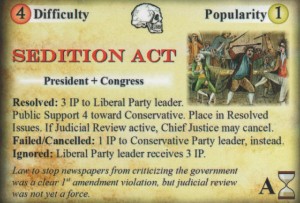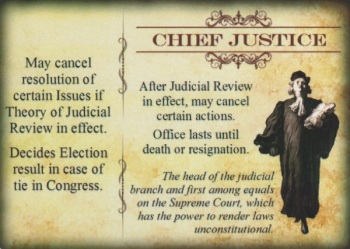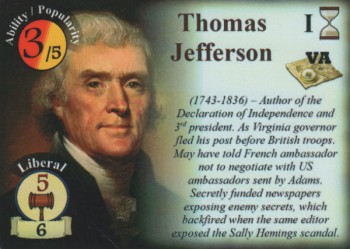A Preliminary Review of Founding Fathers
by Mark D.
Overview
You’re John Adams, President of the United States and Conservative Party leader in the fledgling American republic. George Washington has retired from public life, leaving massive shoes for you to fill. The nation is growing in leaps and bounds and the issues you must contend with grow more complicated and inflammatory each day. Are you up to the task?
Founding Fathers, a new release from Rick Heli for Spotlight on Games, is a game of political maneuvers, interpersonal skills, and intrigue (depending on the temperament of the players). It is designed for 3 to 6 players, with each player controlling one or more Statesmen of the period. The game covers the nascent American republic from the days of the Constitutional Convention in 1787 to the outbreak of the Civil War in 1860, but may end sooner if the nation either bankrupts itself or breaks apart due to political differences.
I had the opportunity to play an in depth learning session last week and, although that’s hardly enough experience to base a review on, I wanted to record my initial impressions of the Issue resolution process. I also have a second session scheduled for tomorrow with a full complement of 6 players. I will write a full review some time after after that.
The Game Turn
A game turn in Founding Fathers consists of the player controlling the current President revealing Issue Cards and attempting to deal with the Issues contained therein. Some issues can be handled by the President alone. Others require the President to delegate to an office holder, such as the Secretary of the Treasury, for resolution. Many also require the approval of Congress.
Each Issue displays a Difficulty Level that represents the relative complexity of resolving the Issue, and may list rewards for successful resolution and/or penalties for failure to resolve.
Players use their Statesmen’s individual Ability Ratings along with accrued Influence Points (IP) to “get things done”.
In last week’s game, one of my Statesmen was John Adams, President and leader of the Conservative Party. One of my opponents controlled Thomas Jefferson, leader of the Liberal Party.
First Issue: The Sedition Act
The first Issue of my presidency (as the player controlling John Adams) was the introduction of the Sedition Act. Overly critical newspapers and French immigrants of doubtful loyalty (in our Conservative opinion) spurred fellow Conservatives to propose the Sedition Act, which prescribed pecuniary fines of up to $2000 and up to 2 years in prison for those too aggressive in their criticism of the government.
Although clearly a First Amendment violation, I attempted to use all my abilities and influence to get the Act through Congress.
Passage of the Sedition Act will play well with the American public, whose fears have been exacerbated by the French Revolution and its accompanying horrors. So Public Support will swing heavily in favor of the Conservatives should they get this Act passed. For those “in the know”, however, passage of this act will be a giant step backwards toward tyranny, and the opposition Liberal Party stands to gain strength and political capital from its passage over their objection.
I could just “Ignore” the issue, but that will make me appear weak and irresolute, and will enhance Jefferson’s stature, so that’s not an option. So, I decide that the Conservative Public Support gains are most important, and resolve to go for it. I begin polling the Congress to see if I have sufficient votes to get the Act passed. Without a doubt, I do, so I present the Issue to Congress for a vote.
Jefferson, as Liberal Party leader (and future Presidential hopeful) is casting about for some means of preventing passage of the Act. He knows that the Conservatives have the necessary votes in Congress. So Jefferson turns to the recently appointed Chief Justice, John Jay. Jefferson knows that Jay has political ambitions of his own and promises to enhance Jay’s influence in Congress if Jay will agree to use his authority as Chief Justice and Cancel the Sedition Act Issue (all behind the scenes of course since they are in different parties).
Jay agrees and the issue is cancelled! Instead of the significant shift in Public Support towards the Conservatives, I end up with a measly 1 Influence Point. Jefferson has skunked me again!
Also note that historically the “Judicial Review” laws were not in place, so John Jay did not have the opportunity to cancel the Alien and Sedition Acts, and they passed. But they were repealed 2 years later in 1800.
Initial Impressions
What an interesting and fun game! Since we did not have a full complement of 6 players, the initial plan was that we were going to play Founding Fathers for about an hour, just to get our feet wet and learn a bit about the system, and then we’d move on to another game. Well we ended up playing Founding Fathers all night, and agreed that another session was definitely in order as soon as possible.
We contacted the game’s designer, Rick Heli, for some rules clarifications and got immediate responses, so I’m hopeful that the game is going to get excellent support. And that’s important with a game like this because it’s very “open-ended”. There’s a lot of depth to the game, particularly in the negotiation aspect, that can’t be codified in a rule book (and shouldn’t be attempted). In such cases, knowing the designer’s intent and what he/she was trying to model can help prevent the game from getting bogged down by rules lawyers.
It was really cool watching the light bulb “light up” over the heads of the players as they realized how a particular strategy could be used, or when it finally hit them as to why a particular rule exists, or the potential benefits of using a given Action card properly.
There’s so much more to this game than I’ve mentioned here, but I prefer to wait until I’ve done a more thorough evaluation before trying to paint a complete picture. The reason I decided to proceed with this early review is because I’m hoping to interest others in playing so that I can see what they discover about it!. Looking forward to another session…







Surprised to see another “Founding Fathers” board game, given the similar title of another game covering the Constituational Convention that is was released not that long ago.
Mike,
The only other one I’ve seen has the exact same title, from 2010, but only covers the Constitutional Convention. The game I’m playing covers the first 70+ years of the American republic and appears to be a much different animal.
Is it the duplication of the name that surprises you? Or is it the similarity of the subject matter?
The Founding Fathers under discussion was actually first, being first published in 2007.
Hi Mark interesting game and terrific review
Thanks
John
Thanks John. The jury is still out on the long term viability of the game (replay value, etc), but I’m certainly enjoying it so far.
Just FYI, now expanded by Founding Fathers: Offices & Statesmen. For more see http://spotlightongames.com/rules/Ff